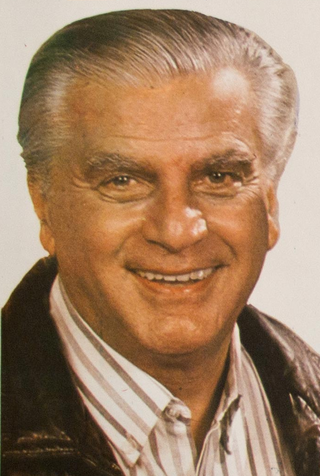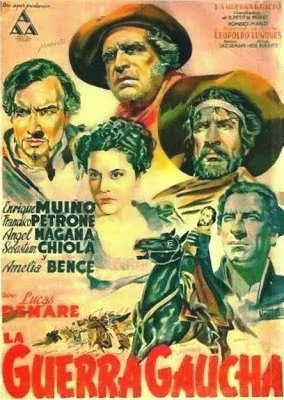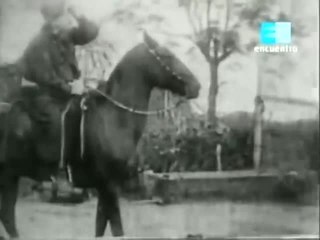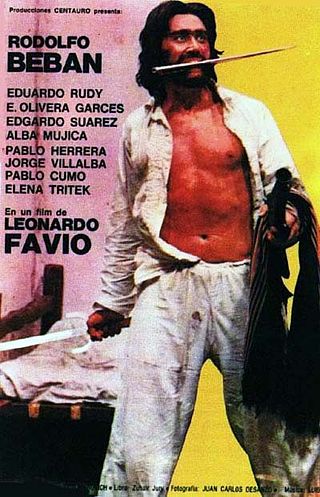
Juan Moreira (1819 - April 1874) is a well-known figure in the history of Argentina. An outlaw, gaucho and folk-hero, he is considered one of the most renowned Argentinian rural bandits. [1]

Juan Moreira (1819 - April 1874) is a well-known figure in the history of Argentina. An outlaw, gaucho and folk-hero, he is considered one of the most renowned Argentinian rural bandits. [1]
Moreira was born in the administrative area of La Matanza, in the Province of Buenos Aires, Argentina. The first thirty years of his life were relatively uneventful, working in rural areas until he could buy his own ranch, some cattle, and land for farming. One characteristic that set him apart from others was that he rarely drank. Moreira devoted his free time to perfecting his skill on the guitar, which attracted the attention of Vicenta, the daughter of a local rancher. She fell in love with Moreira and eventually married him, with the full consent of her father.
Shortly after Moreira married Vicenta, his troubles began. The Deputy Mayor of the area, known as Don Francisco, had also fallen in love with La Vicenta, so as a form of vengeance he began charging Moreira fines for everything he could think of, real or imaginary. The first thing he did was charge Moreira 500 pesos for having his wedding celebration without proper authorization.
About that time, Moreira had lent Mr. Sardetti, a grocery-store owner, the sum of 10,000 pesos to buy merchandise. Fed up with asking for his money back, Moreira went to the Deputy Mayor, without any documentation, as was the custom at that time between men of their word, and reported what had happened in hopes that the Deputy Mayor would insist that Sardetti pay him back. It is unclear if Sardetti and Don Francisco were conspiring against Moreira, but Sardetti denied the story, and Moreira was thrown in jail for 48 hours for a form of attempted robbery.
This situation made Moreira so angry that he swore that he would stab Sardetti for every single peso he had lost. Moreira fulfilled his oath when he killed Mr. Sardetti in a facon duel at Sardetti's grocery store. Returning home after a night of wandering, he found Don Francisco and four other soldiers waiting to arrest him. He resisted, and during the fight, Don Francisco and two soldiers were killed.
Extremely able in knifefights, Moreira won them all, even against more than one person. He gained such fame for this that men looked for him and picked fights with him to gain the glory of defeating him, but he never lost. He avoided fights whenever he could, and only killed after repeated provocation and in self-defense. Eventually, he served as a bodyguard for powerful politicians who promised to clean Moreira's reputation, but they never did so.
It is said that Moreira never took the saddle off his horse, just in case he had to make a quick escape. He spent much of this part of his life wandering through different towns and cities of the province of Buenos Aires, Argentina, including Navarro, Las Heras, Lobos, Veinticinco de Mayo and the lands of the Indian Cacique Coliqueo.
In April, 1874, Casimiro Villamayor, the justice of the peace in Lobos, was ordered by Mariano Acosta, governor of the Province of Buenos Aires, to send a posse led by Commander Bosch from the police department in Buenos Aires to arrest Moreira. They surrounded the grocery and saloon (pulpería) named La Estrella, where Moreira was holed up. Moreira fought like a wild animal against the police, and he was at the point of leaping over the wall which separated him from his horse when he was bayoneted in the left lung by one of the officers, Sergeant Chirino. Moreira managed to shoot at Chirino, who lost an eye, as well as to injure one other officer before he died. He was survived by his wife and a child, also named Juan. He was buried at the Lobos cemetery.
Juan Moreira is one of the most important figures in the popular history of Argentina. His life was laden with the violence and injustice which typified the unfair treatment received by the gauchos, treatment which led to his death. His skull and some personal belongings can be seen at Juan Domingo Perón Museum. His life inspired a very popular novel by romantic author Eduardo Gutiérrez, which in turn inspired at least four biographical films entitled Juan Moreira. [2] The most important of these films, Juan Moreira was directed by Leonardo Favio in 1973, starring Rodolfo Bebán as the title character. The night of his death was fictionalized by Jorge Luis Borges in a short story, La noche de los dones.

Lobos is the headquarters city of the Lobos Partido in Buenos Aires Province, Argentina. It was founded on 2 June 1802 by José Salgado.

Adolfo Rodríguez Saá is an Argentine Peronist politician. Born in a family that was highly influential in the history of the San Luis Province, he became the province's governor in 1983, after the end of the National Reorganization Process military dictatorship. He remained governor up to 2001, being re-elected in successive elections.

The following is an alphabetical list of topics related to the Argentina.

The Federalist Party was the nineteenth century Argentine political party that supported federalism. It opposed the Unitarian Party that claimed a centralised government of Buenos Aires Province, with no participation of the other provinces of the custom taxes benefits of the Buenos Aires port. The federales supported the autonomy of the provincial governments and the distribution of external commerce taxes among the provinces.
Irish Argentines are Argentine citizens who are fully or partially of Irish descent. Irish emigrants from the Midlands, Wexford and many counties of Ireland arrived in Argentina mainly from 1830 to 1930, with the largest wave taking place in 1850–1870. The modern Irish-Argentine community is composed of some of their descendants, and the total number is estimated at between 500,000 and 1,000,000.

Gaucho literature, also known as gauchesco ("gauchoesque") genre was a literary movement purporting to use the language of the gauchos, comparable to the American cowboy, and reflecting their mentality. Although earlier works have been identified as gauchoesque, the movement particularly thrived from the 1870s to 1920s in Argentina, Uruguay and southern Brazil after which the movement petered out, although some works continued to be written. Gauchoesque works continue to be read and studied as a significant part of Argentine literary history.

Antonio Francisco Cafiero was an Argentine Justicialist Party politician. Cafiero held a number of important posts throughout his career, including, most notably, the governorship of Buenos Aires Province from 1987 to 1991, the Cabinet Chief's Office under interim president Eduardo Camaño from 2001 to 2002, and a seat in the Senate of the Nation from 1993 to 2005.

Laura Ana "Tita" Merello was an Argentine film actress, tango dancer and singer of the Golden Age of Argentine Cinema (1940–1960). In her six decades in Argentine entertainment, at the time of her death, she had filmed over thirty movies, premiered twenty plays, had nine television appearances, completed three radio series and had had countless appearances in print media. She was one of the singers who emerged in the 1920s along with Azucena Maizani, Libertad Lamarque, Ada Falcón, and Rosita Quiroga, who created the female voices of tango. She was primarily remembered for the songs "Se dice de mí" and "La milonga y yo".

The Gaucho War is a 1942 Argentine historical drama and epic film directed by Lucas Demare and starring Enrique Muiño, Francisco Petrone, Ángel Magaña, and Amelia Bence. The film's script, written by Homero Manzi and Ulyses Petit de Murat, is based on the novel by Leopoldo Lugones published in 1905. The film premiered in Buenos Aires on November 20, 1942 and is considered by critics of Argentine cinema to be one of the most successful films in history. It won three Silver Condor awards, including Best Film, Best Director, and Best Adapted Screenplay, given by the Argentine Film Critics Association at the 1943 Argentine Film Critics Association Awards for the best films and performances of the previous year.

Nobleza gaucha is a 1915 Argentine silent film, loosely based on the Martín Fierro by José Hernández and Santos Vega by Rafael Obligado. It was directed by Eduardo Martinez de la Pera, who shared credit with Humberto Cairo, the producer, and Ernesto Gunche, the cinematographer.

Juan Moreira is a 1973 Argentine dramatic historical film directed by Leonardo Favio and starring Rodolfo Bebán. It is based on the homonymous novel by Eduardo Gutiérrez, which narrates the life of the famous Argentine outlaw, gaucho and folk hero Juan Moreira.
Colonel José María Morales (August 14, 1818 – October 23, 1894) was a military officer and Afro-Argentine legislator who fought in the Argentine civil war and the Paraguayan War.
Ciudad Madero, also known as Villa Eduardo Madero, is a city in La Matanza Partido, Buenos Aires Province, Argentina. It is located within the Greater Buenos Aires metropolitan area.

Buenos Aires is one of the world's capitals of theatre. The Teatro Colón is a national landmark for opera and classical performances; built at the end of the 19th century, its acoustics are considered the best in the world, and has undergone a major refurbishment in order to preserve its outstanding sound characteristics, the French-romantic style, the Golden Room, and the museum at the entrance. With its theatre scene of national and international caliber, Corrientes Avenue is synonymous with the art. It is thought of as the street that never sleeps, and sometimes referred to as the Broadway of Buenos Aires. Many careers in acting, music, and film have begun in its many theaters. The Teatro General San Martín is one of the most prestigious, along Corrientes Avenue, and the Teatro Nacional Cervantes functions as the national stage theater of Argentina. The Teatro Argentino de La Plata, El Círculo in Rosario, Independencia in Mendoza, and Libertador in Córdoba are also prominent. Griselda Gambaro, Copi, Roberto Cossa, Marco Denevi, Carlos Gorostiza, Alberto Vaccarezza and Mauricio Kartun are a few of the more prominent Argentine playwrights. Julio Bocca, Jorge Donn, José Neglia, and Norma Fontenla are some of the great ballet dancers of the modern era.

Carlos Morel was a prominent Argentine painter in the nineteenth century, known as the first truly Argentine painter.

Casimiro Alegre (1741–1825) was an Argentine politician and military man, who had an outstanding participation during the Viceroyalty of Peru and Viceroyalty of the Río de la Plata, serving as alcalde of campaign in the Province of Buenos Aires, and as Commandant in the Regiment of Blandengues of the Frontier of Buenos Aires.
Events in the year 1879 in Argentina.

Fernando César Ochoa was an actor from Argentina who appeared on radio, in films and on TV.

Arturo Berutti was an Argentinian composer of classical music and librettos. He was best known for his notable theme Pampa (1897). The opera was based on the life of Juan Moreira. One of the influential Argentinian opera composers of the late 19th and early 20th century and his music was influenced by the Italian opera. In 1895, he composed the opera Taras Bulba inspired on the novel by Nikolai Gogol.

Eduardo Félix Valdés is an Argentine politician, currently serving as National Deputy elected in the Federal Capital. A member of the Justicialist Party, Valdés served as the Argentine ambassador to the Holy See during the presidency of Cristina Fernández de Kirchner.